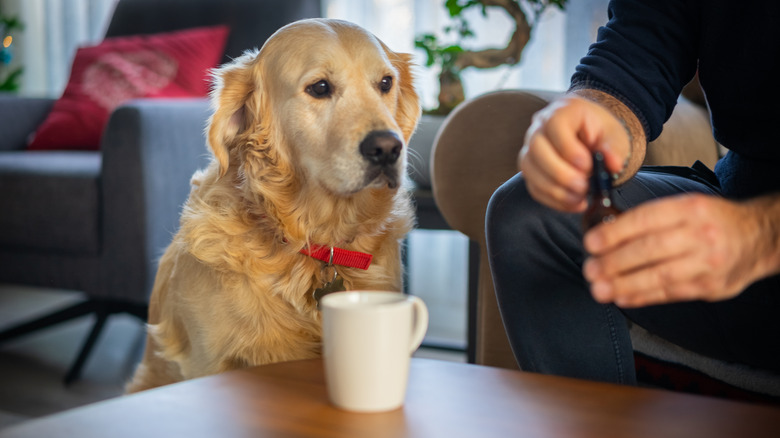The Popular Alternative To Calming Dog Treats That Many Humans Take, Too
Dogs experience many of the same emotions that we humans do: happiness, sadness, anger, fear, anxiety, and so on. While they can't tell us what they're feeling, their body language usually gives it away. Sometimes, their emotions can put them in danger or prevent a peaceful visit to the vet or groomer. This has led to the launch of products like calming collars, toys, anxiety vests, and chewable supplements, but these aren't the only options to alleviate a stressed pup. As an alternative to calming dog treats, some owners use cannabidiol oil, better known as CBD oil.
CBD is a naturally occurring compound found in the cannabis plant. Most CBD oil is derived from hemp and used in various over-the-counter products. CBD may offer a range of potential benefits for humans, including relief from anxiety, insomnia, and pain. It's also used to treat physical conditions in animals, like inflammation and seizures, but it may also help a dog's' mental health, too.
Despite its popularity among pet parents, however, CBD oil hasn't been approved by the U.S. Food and Drug Administration (FDA) for use in dogs. It's best to carefully consider the potential risks and speak with your veterinarian if you're considering giving your four-legged friend this substance to help it relax. They may or may not recommend it, or at the very least, they'll be able to provide more information.
How CBD oil may lower canine stress at a specific dosage
With all the buzz about the benefits of CBD oil for both pets and humans, more researchers have been conducting studies to examine the effects on dogs' mental health. One of the most recent ones occurred in 2023, published in Frontiers in Veterinary Science. The goal of the study was to determine if a single dose of CBD without tetrahydrocannabinol (THC) could calm dogs in certain stressful situations. The researchers then assessed the dogs' behavior throughout the experiment.
For the study, 21 dogs were left alone in a familiar, enclosed room with food, water, bedding, a crate, and toys nearby. Nineteen others were placed in a size-appropriate metal dog crate with bedding in a moving minivan for 10 minutes, with speeds at or below 10 mph. If you're a seasoned dog owner, you probably know a thing or two about how stressful both of these scenarios can be for a pet. The dogs in the experiment were no exception.
Using specific measurement tactics, researchers determined that being left alone caused separation anxiety symptoms for the pups, but the car rides caused a higher amount of stress. However, after being given a specific amount of CBD before exposure to these settings, the dogs showed a reduction in stress. Wondering about the effects of varying doses or other circumstances that a dog might find worrying? More research is needed to address those questions.
The risks associated with CBD oil for dogs
Just as with many other substances with medicinal qualities, CBD can be dangerous for pets. For example, a few studies noted by the Cornell University College of Veterinary Medicine have shown that CBD can affect a dog's liver enzymes involved in metabolizing medication. This means that using CBD alongside another medication could lead to interactions that alter how the prescribed drug works. It may also impact the recommended dosage.
Dogs can also experience CBD oil toxicity symptoms, including restlessness, vomiting, diarrhea, an accelerated or decelerated heart rate, pale gums, and rapid breathing. As CBD oil isn't approved by the FDA, the exact dosage that would lead to these toxicity symptoms is unknown. This means that without the guidance of a veterinarian, a pet owner wouldn't know how much to give their dog.
As research continues on the effect of CBD and CBD oil on pets, we just might see the day when these substances receive the FDA stamp of approval. Until then, it's best to speak with your veterinarian about your dog's anxiety, as there are many FDA-approved prescription medications you may want to try instead.
Always consult your veterinarian before making changes to your pet's diet, exercise, or care. To find an accredited veterinarian in your area, you can search the American Animal Hospital Association's online database.


